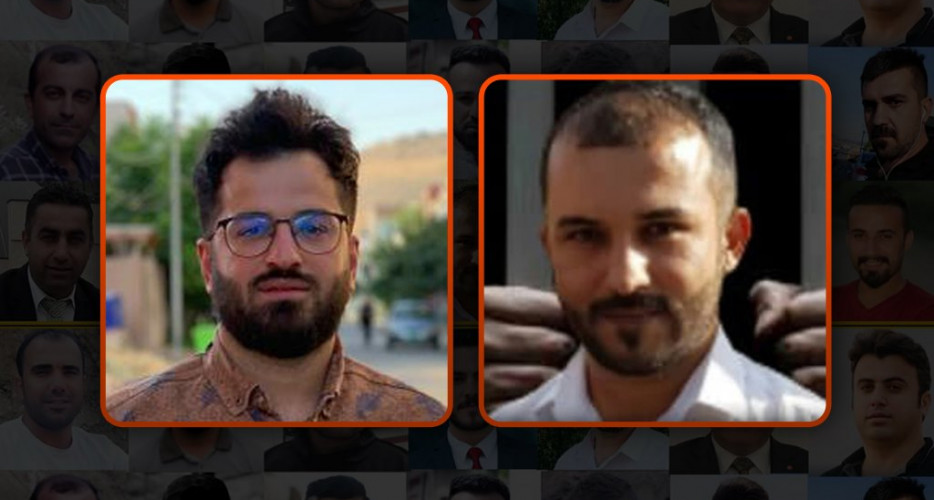
PEREGRAF- Sangar Salar
Dozens of people detained in the Kurdistan Region’s Badinan area have spent more than six months in prison without the authorities releasing any information about the accusations against them or the conditions under which they are held.
While the five journalists and activists who were sentenced to six years in prison by a court in Erbil in February have garnered the lion’s share of attention, the fate of the other detainees is also important, in particular for their families who are left searching for answers.
"Even now, we don't know on what charges he has been arrested and they won't tell us," Hamudy Aiub told PEREGRAF, referring to his brother Bandawar Aiub who was arrested at his home on September 4.
"He didn’t participate in any demonstrations or activism; he was just working," he added.
Since he was arrested seven months ago, Bandawar has only been able to call his family twice and have a brief five-minute visit at the Erbil General Asayish headquarters, his brother said.
Bashdar Hassan, a lawyer working on the cases of the people who were detained in Badinan, told PEREGRAF about how difficult it has been to get even basic information about who has been arrested, where they are being held, and under whose custody.
He said that he has been trying to obtain documentation about nine detainees who were summoned and arrested by the Asayish after they participated in a demonstration in Duhok governorate’s Shiladze town. Specifically, he has been trying to get fingerprint records that would show that they are in Asayish custody.
"The judge gave an order for the fingerprints, but the Asayish won’t allow us to collect them and they send us away every time with an excuse," Hassan said.
"We have gone many times to get the fingerprints of those prisoners. We hand over the order to the security forces to give us the fingerprints. The last time was on March 17. They said that the fingerprinting has not been completed," he continued.
"How much time do they need to take fingerprints?"
According to investigations by PEREGRAF, dozens of people were arrested last year in Erbil and Duhok governorates, an area sometimes known as Badinan, in reference to the variety of Kurdish spoken there. It is a stronghold of the Kurdistan Democratic Party (KDP), which controls the local security forces.
Others have arrest warrants out for them, but have fled to other parts of the Kurdistan Region to avoid being detained.
Parwar Rostinky’s brother Karkar was arrested on September 5. He told PEREGRAF that his family does not know what charges his brother may be facing.
"He did not participate in any rally or demonstration. They will not let us or his lawyer see him," Rostinky said, explaining that his brother was a student and driving a taxi on the side at the time of his arrest.
He said that the Erbil Asayish have only allowed them to see Karkar once since he was arrested.
"When we go to visit him, they always have an excuse so no one can see him. Once they said it was because of coronavirus and another time they said something else," he added.
PEREGRAF spoke with several lawyers representing people detained in Badinan last year, but they could offer only limited information about the cases. Some relatives of those who were detained were not ready to speak to the media.
Most were arrested in a roundup by KDP-affiliated security forces following a violent demonstration in Duhok’s Zakho town, near the Ibrahim Khalil border crossing with Turkey on the night of August 19. Angry that coronavirus-related restrictions were lifted on Turkish truckers coming into the Kurdistan Region without reciprocation by Ankara for those from the Kurdistan Region, the protesters tried to block the highway and the situation devolved into chaos. A number of civilians and members of the security forces were injured.
Some of those arrested in subsequent weeks have been charged with undermining the security of the Kurdistan Region, including journalists and activists Sherwan Sherwani, Guhdar Zebari, Ayaz Karam Shvan Saeed Omar, and Hariwan Issa, whose sentencing in February elicited domestic and international outcry. They are appealing the verdict.
But for many others arrested in the sweep, the charges against them are not clear, lawyer Ramadan Artisy explained to PEREGRAF.
"Only the cases of the seven people who have appeared in court are clear: those who were sentenced and Badal Barwary and Omed Baroshky. They all have the same charges against them," Artisy said.
The Kurdistan Region’s Security Council published a heavily edited video that purported to show the five sentenced detainees confessing to alleged crimes. Their lawyers and families quickly rejected the clip as propaganda.
"According to the law, we must be present as their lawyers at the investigation stage. Unfortunately, we were not allowed to read the documentary evidence until the day of the court trial," Artisy said, noting that the five defendants said that their alleged confessions were obtained through coercion.
The lawyer gave an example of the poor quality of the evidence against his clients, saying that they were accused of spying on the Kurdistan Islamic Union (KIU), a local political party.
"We asked how they had spied on the Islamic Union? There was no information in the confession that they spied on them," Artisy said.
"[The prosecution] said they spied on behalf of neighboring countries. We asked, ‘for which country?’ They had no information about which country," he added.
Among those being held in Badinan without a clear charge against them are teenagers, including two brothers who are under 18-years-old named Amin and Aiman Saadullah Ahmed.
Artisy urged the families of the detainees who still lack legal representation to come talk with them.
"We can’t work [on their cases] without authorization. I don’t know why they don’t come to us," he said.